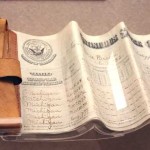Genealogy Military Records
Forces War Records
June 23, 2012 by ramona
Filed under Articles, Genealogy Military Records, Genealogy Records 101, Latest News
 If you are searching for ancestors who served in the British Military Forces, you may want to check out Forces War Records; a new genealogy site that looks to be one of the best-organized search sites of its kind on the net.
If you are searching for ancestors who served in the British Military Forces, you may want to check out Forces War Records; a new genealogy site that looks to be one of the best-organized search sites of its kind on the net.
Forces War Records has over four million records for British Armed Forces personnel.
However, what makes this site special for family tree researchers is its search system. The records are cross-matched with bases, and regiments as well as Ships of the British Armed Forces, providing a usage that is easy to apply, accurate and time saving.
|
The Records Include
|
|
|
World War One World War Two Crimean War Databases Boer War Databases African Wars Databases Indian Mutiny Databases Napoleonic Wars Databases Medal Rolls |
Individual Battle Data Other Wars Casualty Lists Prisoner of War Records Royal Marines Databases Fighter and Bomber Command Losses Fleet Air Arm Data RFC/RAF List RN Losses |
|
Shot at Dawn Database and more !!!
|
|
The site has many cool features including:
- A free search for WWII POWs with information that lists
- Name
- Rank
- Service Number
- Regiment
- POW number
- Camp type/number and location plus notes.
- A free medieval search with search tips
- A community forum
- Tutorials
- A “Memories” section where you can record your own or read stories left by other members.
- Genes Magazine: an online journal that gives access to How to and historical articles.
Some other aspects of the site include the ability to save your searches and bookmark pages to your profile. Of course, registration is required to use the site and there is a reasonable fee for full access to records. Although the fees are reasonable, prospective users should be aware that they are in pounds sterling.
Before you get started on your search at Forces War Records, be sure to download Genealogy Beginners Military Research Tracking Form, available with your 30-day free trial membership.
“Who Do You Think You Are”, Episodes 1 & 2: Family Lore
February 16, 2012 by ramona
Filed under Articles, Genealogy Military Records, Genealogy Records 101, Latest News
 “Who Do You Think You Are” begins each episode by saying “To know who you are, you have to know where your story began”. Those words could not ring truer than in the first two episodes of season three.
“Who Do You Think You Are” begins each episode by saying “To know who you are, you have to know where your story began”. Those words could not ring truer than in the first two episodes of season three.
Episode One: Martin Sheen
With a colorful history of his own, Mr. Sheen has made headlines for his efforts as a civil activist supporting issues from liberal politics to environmental concerns. It was hardly a surprise to learn that his passionate outspoken nature may stem from ancestral roots on both sides of his family.
Mr. Sheen begins his genealogy journey with a little family lore. The subject of this family tree investigation is Michael Phelan, an uncle on his mother’s side, who was reportedly a volunteer in the Irish Republican Army.
To help Mr. Sheen uncover the truth behind the family tale, “Who Do You Think You Are” applies a number of research methods and utilizes all relevant resources.
In the first part of this episode, we see genealogical research conducted through an examination of:
The discoveries made during this systematic process uncovered an unexpected truth. For years, Mr. Sheen’s family had believed that their legendary ancestor fought on the side of the IRA. However, his visit to the Military Archives revealed that Michael Phelan actually fought for the opposing side…the Irish National Army.
Episode Two: Marisa Tomei
Marisa Tomei was the guest on the second episode of “Who Do You think You Are” season three. In this episode family lore also plays a big part in the Tomei family’s desire to dig in to their past.
The subject of the story is Marisa’s Great Grandfather Leopoldo, who was murdered for uncertain reasons. Family legend hints that the murder was motivated by a possible love affair or a debt he owed, shedding an unflattering light on this notorious ancestor.
As the Tomei story unfolds, “Who Do You Think You Are” takes us on a trip to Italy where Marisa wades through a maze of documents, research resources and consultations with experts who help her to examine:
However, before she leaves Marissa visits her mother who has uses a well know genealogy database to make a family tree.
Perhaps one of the most enjoyable components of family tree research is the family history aspect. Learning the truth behind stories passed from generation to generation. Often these stories have a grain of truth, rarely is it ever the whole truth as we see in the first two episodes of season three.
If you missed this episode of “Who Do You Think You Are”, join us in the forum The Discovery Panel for a link to where you can watch the episode online free. You didn’t think I was going to ruin the ending did you? Also, join us for a genealogy research tip based on the first two episodes.
Image Credit: Rav 7 Via Photobucket
A Military Records Search Strategy for Your Family Tree
November 11, 2011 by ramona
Filed under Articles, Genealogy Military Records, Genealogy Records 101, Public Records
 Having an ancestor who served in the military is a source of pride for many families and justly so, making military genealogy a popular avenue of research. Who would not want to delve into the details of their forebear’s military service in order to honor these family heroes? Finding the details of their service however, can be a challenging prospect, especially when it comes to more recent records. To make matters more confusing, the sheer number of online databases can be overwhelming to the genealogy beginner; making it difficult to know where to begin.
Having an ancestor who served in the military is a source of pride for many families and justly so, making military genealogy a popular avenue of research. Who would not want to delve into the details of their forebear’s military service in order to honor these family heroes? Finding the details of their service however, can be a challenging prospect, especially when it comes to more recent records. To make matters more confusing, the sheer number of online databases can be overwhelming to the genealogy beginner; making it difficult to know where to begin.
Having a good step by step strategy for your research will undoubtedly help uncover your predecessors courageous past.
The first step: start with what you know
Your search for military documents is no different than any other type of genealogy research, in that, the first step of any ancestor hunt is starting with what you know. Do you or another family member have any military memorabilia such as discharge papers, medals, photographs, weapons or even uniforms? If so, that is clearly the place to start. Any and all of these things can provide valuable information to help set you on your way to recovering more records needed to put new buds on your family tree.
The second step: focus on your target
Decide on your target. What do you want to find first. This may include educating yourself on the many types of military records available. It is important to know what records you are looking for, before you can start searching for them. Also, note that records may differ for the time frame you are searching, be it the war of 1812, the Civil War or World War II. In addition, the branch of military your family member served in Army, Navy or Coastguard etc, will have some bearing on your search strategy. For instance during the second world record types include:
- World War 2 Personnel Files
- World War 2 Military Unit and Ship Records
- Merchant Marine Records
- Army Enlistment Records
- Draft Records
- World War 2 POW Records
- World War 2 Casualties
- Cadet Nurse Corps
- Internment and Relocation Records
- Civilian Participation at Home
The most important of these records for the beginning genealogist is the record of discharge or “Report of Separation” which is kept in the personnel files. A Report of Separation is generally a one page document that contains all of the information concerning your ancestor’s service such as rank, dates of service, service number, unit, battles and campaigns as well as any decorations and awards received.
Step three: identify your resources
Online
Online genealogy sites are fast becoming the main resource for genealogists researching military records. With the advent of digitized records they are available from both subscription sites as well as archival collections held by government agencies. Whether you choose to use a paid resource, which is quite often more convenient and often gives faster results due to their searchable databases, or conduct a manual search of archived records, may depend on the time and money you have to spend. One of the more prominent online sites for military genealogy is Fold3.com. Formerly Footnote.com, Fold3 is owned by the same company as ancestry.com. The company has decided to use Fold3 exclusively as a site for searching military records.
Government archives are your best pick if you are working within a budget from your home computer and have the time to conduct a manual search. It is important to note that not all government archives have available records online; the availability of records can vary with the country you are searching. As a last word and this can be important to your genealogy budget, before you pay for a subscription, check with your local library. Many libraries (both local and university libraries) have free in-library access to ancestry.com.
Hard Copy
Hard copy records are a resource that should never be overlooked. Searching for hard copy records requires a little footwork but can present a huge pay-off; the main source for these record types includes state and provincial archives. It also pays to check with historical and genealogical societies as they frequently have military record collections. One last resource that bears mentioning is newspaper archives held by most libraries on microfilm. Local newspapers are rich with family history information as they often contain stories of departing and arriving local soldiers, in addition you may also find mentions of a soldier’s letter home.
Final Step: analyze your findings
Once you have collected the records you have set out to find, analyze them closely as they may lead you to your next search target. For example, a copy of your great grandfather WWII discharge papers will tell you of any awards or honors he received. This may lead to questions about why, when and how he received them. If a Purple Heart Medal is listed, this tells you he was wounded or killed in service, a Silver Star indicates valor in the face of the enemy. This certainly enriches your family history in addition to helping you understand what kind of person he was.
A good genealogy community can be a great boon in helping to sort out what you need to know in order to make a strong start. If you need some help in this area, join us on the Discovery Panel forums for further discussions on military records
Accessing Military Records
March 8, 2009 by Chris
Filed under Articles, Genealogy Military Records, Genealogy Records 101, General Tips
 The following came from a current subscriber to Genealogy Beginner.
The following came from a current subscriber to Genealogy Beginner.
“Great advice: First I would like to let you know I enjoy your tips. As a beginner they have been very helpful. I know different states have laws in reference to military records. In the state of South Carolina military records are not public. The information can only be given to the individual, their Power of Attorney, or spouse. The SC state statute is very clear and states that the military records can only be used for genealogical research 50 years after the death of the person whose military records are referenced. I know this to be a fact because I work in the office where the military records are recorded in Aiken County, South Carolina.”
We have to be very cautious as to who has access to these documents.
Where to Next? Blank Family Tree Template
Dachau Concentration Camp Records
January 31, 2008 by Chris
Filed under Genealogy Military Records, Genealogy Records 101, Public Records
 The Dachau Concentration Camp Records are a chilling yet important tool for those searching for relatives who may have been impacted by the world wars.Dachua was the first concentration camp established, and registered over 200,000 prisoners over its history.
The Dachau Concentration Camp Records are a chilling yet important tool for those searching for relatives who may have been impacted by the world wars.Dachua was the first concentration camp established, and registered over 200,000 prisoners over its history.
The data contained in these records may include:
- Family name
- Given name
- Date of birth
- Place of birth
- Last place of residence
- Street or provincial location
- Prisoner number
- Category of prisoner
- Date of arrival in Dachau
- Ultimate fate of prisoner in Dachau
Read more about Dachau Concentration Camp Records
Search Dachau Concentration Camp Records
Stephen Morse has a great website with numerous genealogy search references and information. I strongly recommend a visit.
…
Where to Next?
Blank Family Tree with Step-by-Step Instructions
…
US Department of Veterans Affairs
January 28, 2008 by Chris
Filed under Genealogy Military Records, Genealogy Records 101, Public Records
 Wondering if the VA has any records you can use to obtain the military history of a friend or relative? The short answer is no. The U. S. Department of Veterans Affairs does not maintain such as military units assigned to, dates and places of assignment, pay records, etc. For information about military records, visit the National Archives Records Administration website at http://www.archives.gov/.
Wondering if the VA has any records you can use to obtain the military history of a friend or relative? The short answer is no. The U. S. Department of Veterans Affairs does not maintain such as military units assigned to, dates and places of assignment, pay records, etc. For information about military records, visit the National Archives Records Administration website at http://www.archives.gov/.
I’ll post about The National Archives shortly; they have some interesting news today about increases in budgets.
…
Where to Next?
Blank Family Tree with Step-by-Step Instructions
…
